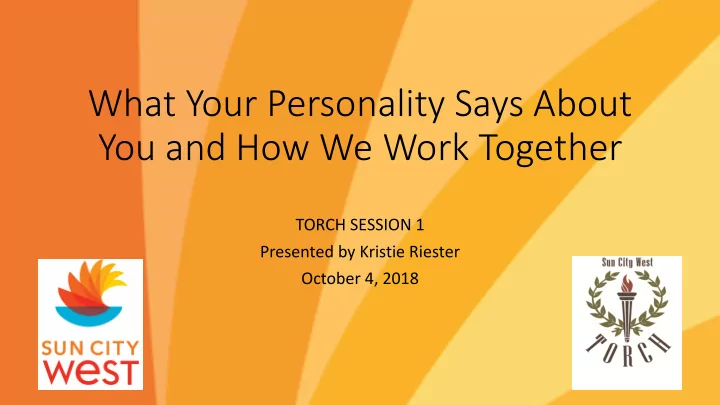

What Your Personality Says About You and How We Work Together TORCH SESSION 1 Presented by Kristie Riester October 4, 2018
History & Background • Developed in 1942 by mother and daughter Katherine Briggs and Isabel Myers based on Carl Jung’s theory • After many years of validating the tool it became available in 1975 • Assumptions that the same basic urges and motivations drive all people • In reality, people have similarities and differences which can lead to misunderstandings • This tool helps individuals understand themselves and others better 2
Most Widely Used Tool in Organizations • It’s self reporting and non judging • Valid across cultures • It allows for opportunities to understand and to be understood by others • The theory underlines that all people have access to each of the different preferences, but that each individual prefers one of each dichotomy • It concentrates on the strengths of each preference • Developed by studying normal people in their day to day lives and indicates normal rather than abnormal behaviors 3
What is the Purpose? • What are my needs? • What are my values? • How do I relate to others? • How do others perceive me? • How and where can I apply my strengths? • What are my development opportunities? 4
Preferences • When we use our preferred methods, we are generally at our best and feel most: • Competent • Natural • Energetic 5
Where We Prefer To Get Our Energy z Extraversion Introversion • Extroverts are energized by people, enjoy a variety of tasks, a quick pace, and are good at multitasking. • Introverts often like working alone or in small groups, prefer a more deliberate pace, and like to focus on one task at a time. 6
E/I Energy E I 8 Hours(E) 1 Hour(E) 8 Hours (I) 1 Hour (I) 7
E/I Exercise • Which type of energy do you prefer? • Divide p into E’s and I’s • Describe your ideal weekend 8
9
How We Prefer To Take In Information Sensing iNtuition • Sensors are realistic people who like to focus on the facts and details, and apply common sense and past experience to come up with practical solutions to problems. • Intuitives prefer to focus on possibilities and the big picture, easily see patterns, value innovation, and seek creative solutions to problems. 10
S/N Exercise • Divide up into S’s and N’s • Without using your phone/navigation, provide directions to the airport 11
Sensing and iNtuition • Jot Down: • How will this knowledge impact how you communicate and work with each other? 12
How We Prefer To Make Decisions Thinking Feeling • Thinkers tend to make decisions using logical analysis, objectively weigh pros and cons, and value honesty, consistency and fairness. This is important to me. • Feelers tend to be sensitive and cooperative, and decide based on their own personal values Pros T F Cons and how others will be affected by their actions. 13
T/F Exercise • Divide up into T’s and F’s • Scenario: • Your co-worker/employee is hit by a car and is in a coma at the hospital. • What do you do? 14
How We Prefer To Live Our Lives Judging Perceiving • Judgers tend to be organized and prepared, like to make and stick to plans, and are comfortable following most rules. • Perceivers prefer to keep their options open, like to be able to act spontaneously, and like to be flexible with making plans. 15
J/P Exercise • What do you believe? Work before play? OR Play anytime? 16
What Is Your Best Fit? • Self Selection Results • Assessment Results • Best Fit 17
Application • How are you going to apply this new knowledge? 18
Putting It All Together • No type is better than another, just different • Everyone uses all type preferences at times • One preference is favored on each scale • Scores indicate clarity/consistency of preference • Understanding your communication style can help you become a better communicator • You can understand which situations allow you to perform your best • Better understand your strengths and weaknesses • Can help you better understand others • Using each other’s strengths can build a better team 19
Questions? 20
Recommend
More recommend